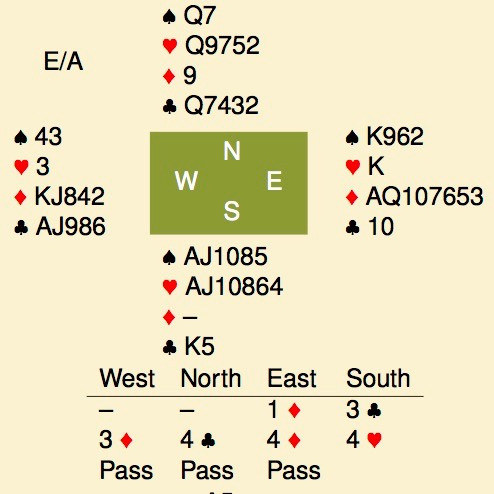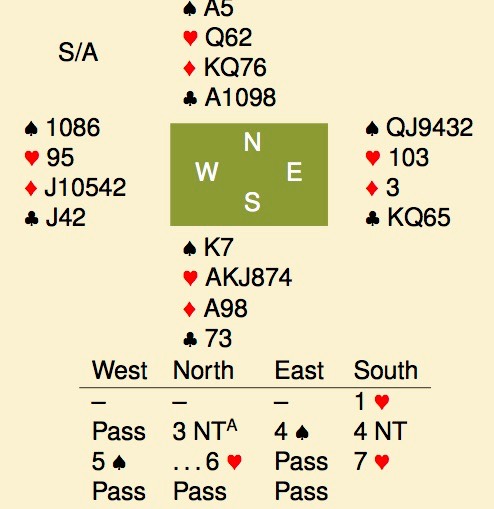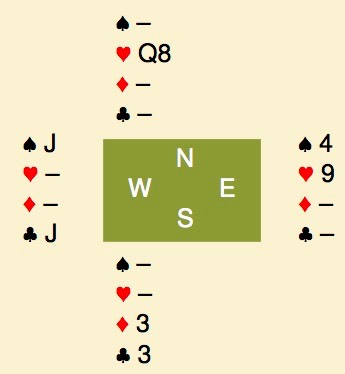Earlier this week, I posted some hands from a training for TD’s that I ran earlier this month. All hands come from local events and were given to me by fellow TD’s in the area. Here are the solutions, or at least, what I think the solution should have been. If you want to see the problems without the solution, go to this page.
Pierre Ghestem is still alive

South asked for an explanation of 3♣ before bidding 3♦. North explains it as “Intermediate”, or an opening bid with a 6 card suit. After 4♥, north says that he forgot that NS are playing Ghestem and 3♣ shows a major 2 suiter. The TD is called, nobody wants to change his bids and 4♥ is played, making with 2 overtricks. EW are not happy with the result and call the TD back. When asked, NS will claim that they have been playing this convention for a couple of years and the convention card supports the claim. Director!
Solution: I was somewhat surprised to see that a number of TD’s did not have a problem with any of this. OK, so south has the unauthorized information that north misunderstood him, but he has a 6th heart so why not show that. This presumably triggered north to wake up and correct the explanation, but north is allowed to wake up anyway. Right?
No, that is wrong. North bids 4♣ at his first turn. That must be natural and a decent hand, with 7 small clubs in a bad hand, you are not going to bid at the 4 level vulnerable. North is unlikely to have support for any of south’s suits, otherwise he’d have bid it. If north has clubs, south has a great hand in support ♣Kx, a void in their suit, and 2 aces. That is worth a 5♣ call. What happens next, is harder to see, but I can imagine that west doubles and all pass, north still not suspecting that south has the majors, and south assuming that he has bid correctly. That makes the contract 5♣x, down about 3. I can also live with 5♣, undoubled, down 3. Matchpoint-wise, it would hardly have made a difference anyway.
6, 7, 12, or 13?

3NT showed 12-15 points with 3-card ♥-support. 4NT asked for keycards. There was an agreed break in tempo of about 2 minutes before the 6♥ bid. EW objected against the 7♥ bid but the TD tells them to play the hand first. West led the ♥9 and declarer shows his hand, I draw all the trumps, then have 4 ♦-tricks, ♠AK and the ♣A for a total of 13. Everybody agrees with the claim and the TD is called back. He establishes that a double of 5♠ would have shown 0 or 2 keycards, and a pass 1 or 3. North says that he couldn’t remember the agreement and took a couple of minutes to (incorrectly) reproduce it. South says that 6♥ systematically doesn’t exist and he gambled something. NS are long time established pair.
The TD takes the board away and tells the players to play the next boards, a hand or 2 later, EW realize that the claim is wrong and call the TD back. So, a score has to be entered: 6♥,=, 6♥,+1, 7♥,-1, 7♥,= or something else?
Solution: The TD who showed me this hand, decided to follow the (good) rule of thumb of dealing with the various infractions in the order that they occurred: first the 7♥ bid, then the claim. He decided that he would not allow the 7♥ bid after that slow 6♥ bid, and that the final contract would be 6♥ by south. He didn’t explain the reasoning behind this, but let’s assume that we agree on this for now. Next, he dealt with the claim, noted that EW realized on time that the claim was wrong and only 12 tricks would be made in a heart contract. (There is a line for 13, by running the ♦9 on the first round of the suit, but declarer did not mention this and he is not allowed to add that to his claim later). 6♥ and 12 tricks, so +1430 for NS.
Needless to say, EW were not very happy with this ruling.
I agree with them. While dealing with infractions in the order that they occur, is a good rule of thumb, it is only a rule of thumb. Here you have to deal with them in the opposite order. First the claim, it is wrong and EW noticed within the time frame set in law 79C, thus it should be corrected. That makes the result on the board 7♥, down 1. If this happened at the table, do you really think that EW would have called the TD back because the 7♥ bidder might have used some unauthorized information? No, of course not, they’d simply chalk up their good score. With that in mind, we score the board as 7♥, -1, leaving the question if NS should be allowed to bid for what it is.
Only 2 cards

With 2 cards left, there usually isn’t much that can go wrong but look at this board. ♥ are trump, west has won trick 11 and is considering his next move. He doesn’t have a full count on the hand, the ♠4 and ♣3 could have been swapped. At that point, the following happens:
- Declarer says “it doesn’t matter what you play, I’ll take the last 2 tricks”.
- “No”, says east, “it really does matter, let him play a card”.
- “Shall we just play on?”, says dummy.
- “That is probably best”, says west and puts the ♠J on the table.
Declarer ruffs with the ♥9. Half a second later, EW realize that the ♣J instead of the ♠J would have given east an overruff. Director!
Solution: This is a case where the correct ruling changed under the 2017 laws. Declarer’s first statement is a claim, play stopped after the claim and the TD had to decide. In the 2017 laws, section 68D2(b) has been added, which says that play can continue if the other side agrees and all 4 players agree. That seems to be the case here, east’s first statement suggests that west plays on, the others agree and a card is actually played. The claim is thus cancelled and whatever the result is after that, is the result on the board. Declarer thus takes the last two tricks. Note the difference with the old laws, or what would have happened if EW objected. Now the TD can rule that west plays a club and EW get 1 trick.
